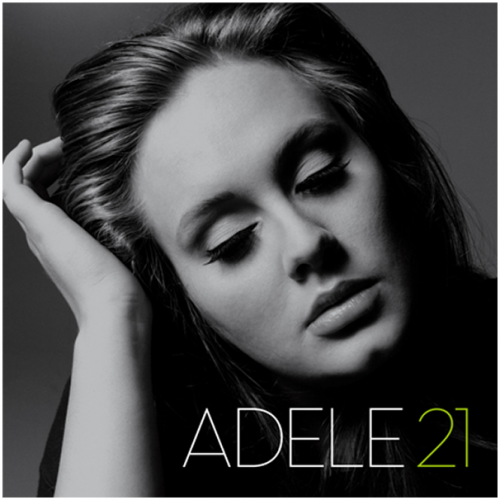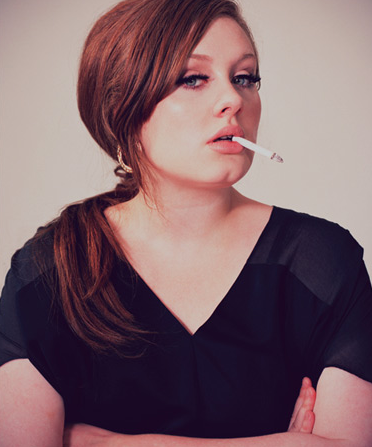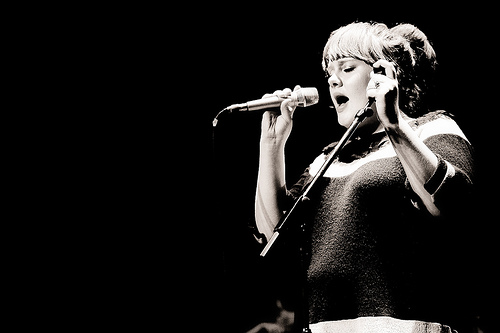Reviews
Album Review: Adele - 21
“There’s a fire starting in my heart // reaching a fever pitch // and it’s bringing me out the dark.”
~ Adele
On January 28, 2008, George W. Bush delivered his final State of the Union Address as President of the United States. On that same date, American music lovers had even more cause for celebration: British singer Adele released 19, a debut album that would earn her two Grammy Awards and result in millions of albums sold. Adele’s second release, 21, came out on January 24th in the UK and will hit the US market next Tuesday, February 22nd. 21’s musical alchemy, concocted at Malibu’s Shangri La Studios, can be attributed to the keen ear of seasoned industry vets like Rick Rubin (who produced the album), stellar musicians like The Roots’ keyboardist, James Poyser, and numerous other collaborators. Even the Malibu air seems to have played a role judging by the wonderfully romantic black and white studio footage, which shows a playful Adele bathed in California sunshine, laughing and dancing.
21 is irresistibly compelling from the start. A guitar strumming itch brings the “fever pitch” Adele’s lyrics refer to on the first track, “Rolling In The Deep” to life. The critics who carelessly reduced both 19 and 21 to ‘albums about boys’ clearly neglected the powerful, lasting force of this UK darling. “Rolling In The Deep” shows a pop singer unafraid to challenge her range with confident, mature vocals and much more bluesy-roots undertones than the first album. 21’s intro track, “a sort of f*ck you,” according to the singer, preemptively--but insufficiently--fills the void left by The White Stripes, who recently announced their breakup. The collaboration with writer-producer Paul Epworth is filled with the same sort of militaristic thump Meg White made iconic in the early 2000s. And if thumping is what you’re into, drummer Chris Dave (and anonymous body percussion ramping up the track like human castanets) gives a steady, metronome pulse to “Rumour Has It.” Adele calls it a “bluesy-pop stomping song” with “dirty guitar,” adding it was inspired by her friends’ gossiping about her and one another, which left her irritated and mortified.
The piano-heavy third track, “Turning Tables,” sets Adele in a class of her own, now that the critics no longer draw lazy comparisons to her early British contemporaries (Amy Winehouse, Duffy, etc). “Turning Tables” is softer and more melancholy than the album‘s openers, reminiscent of her debut album, but more orchestral. On this track, Adele collaborates with producer-songwriter, Ryan Tedder, who also co-wrote “Rumour Has It.” Belting out a raw warrior’s cry, “Next time I’ll be braver // I’ll be my own savior // when the thunder calls for me,” she reveals a bolder yet still guarded woman deep in self-examination. Indeed, Oklahoma-born Tedder was an excellent choice for this collaboration because of his pop and country sensibilities.
Listeners will thank B. Haley, Adele’s bus driver, who inspired this sophomore album by “rockin’ out to country and blues” on tour, says Adele. Haley would also later make country music compilations for the singer to listen to while on the road. The American roots influences are clearest on tracks like “Don’t You Remember,” which is a straight up country ballad, one you’re definitely going to want to play alone in the dark if you’ve recently been left scorned by a lover. “Don’t You Remember” came about when Adele was suddenly struck with shame at her childishness for making her ‘ex’ out to be a “twat" in other songs, she says. In the process of conjuring up what inspired their mutual love in the first place, Adele truly bares her “fickle heart” on this track.
Still, too many collaborations with other artists might have taken away from the album’s feel, which requires the listener be in the mood for some of the heart-wrenching turns in songs like “Take It All,” co-written with Eg White, who also co-wrote: “Chasing Pavements,” “Melt My Heart To Stone,” and “Tired,” on 19. If you’re headed on a road trip, I suggest you hit play on “I’ll Be Waiting” first, especially if you like Eric Clapton, The Beatles, or Lady Antebellum, who is also rumored to have influenced Adele’s ear around the time the album was being written and recorded. “I’ll Be Waiting” will tempt you to call your last love and leave the track playing on the voicemail, a glass of sweet tea vodka in hand.
But if, unlike Adele, you and your beloved have made it to exchanging vows, “One And Only” might be your wedding anthem. It highlights the most genuine iteration of Adele’s voice--conjuring blues and soul giants like Etta James--which belts out the tender lyrics, “I dare you to let me be your one and only.” Adele says it’s the first happy song she’s ever written and agrees it’s “like something out of a movie.” Finally, Adele’s rendition of “Lovesong” (The Cure, 1989) is so delicate and jazzy that its simplicity brings to mind the effortless vocal stylings of Brazilian songstress, Ceu.
Nothing is held back on 21, a public confessional ripe for the film industry’s soundtrack short lists. It very literally traces Adele's personal romantic journey. With her thin skin shed, the singer recognizes her own weaknesses while fighting fiercely against them. Although I found the closing track, “Someone Like You,” a bit flat and uninspiring, the sentiment behind it remains true to the album’s core message: Adele may be sorrowful after two painful breakups, but she’s certainly not going to wallow in self-pity or drown in a destructive celebrity cocktail of abuse. Gossip away. With an increasingly masterful command of many genres, rumour has it the blushing beauty would rather sing the blues instead.


